

Dr. Eddie Siman, the TMJ & Sleep Apnea Expert
You may have been told the pain you are experiencing in your jaw is all in your head or that the pain is temporary and 'nothing to worry about.' Unfortunately, the exact cause of TMJ differs for each patient. Although most professionals believe that causes of TMD are unknown, in most instances, TMJ is caused by a misaligned jaw that is inherited genetically or is caused by improper orthodontics as a child. These problems may lead to grinding and clenching of the teeth that in turn would result in muscle tension causing headaches, migraines, neck and shoulder pain, ringing in the ears, and limitations to the position of the tongue that causes snoring and sleep apnea. Learn more about what's causing these symptoms and discover our holistic Sherman Oaks & Beverly Hills TMJ treatments for your pain relief with Dr. Eddie Siman, the TMJ & Sleep Apnea Expert in Sherman Oaks, California. Dr. Siman has over 30 years of experience dedicated to treating Temporomandibular joint disorder/dysfunction (TMJ) and continues to discover advancing research in the field.
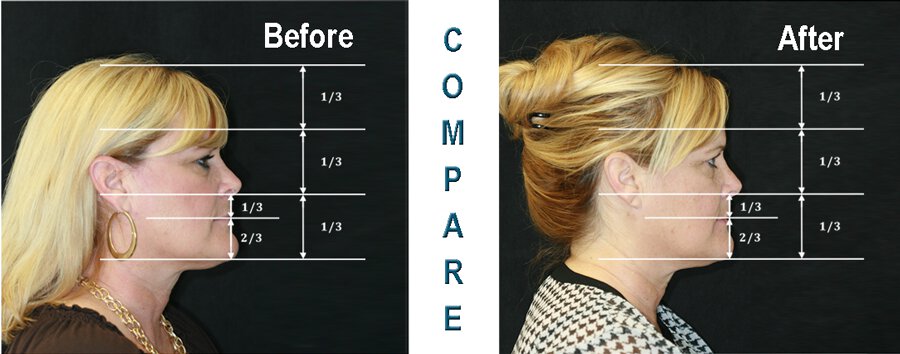

Innovative Holistic Techniques for TMJ Pain Relief
The joint that connects your lower jaw to your skull is your temporomandibular joint (TMJ). It enables your jaw to open and close so you can eat, drink, and eat. Issues affecting your TMJ can cause soreness at the joint, facial pain, and trouble moving the joint. These issues are known as TMJ disorders (TMJD). It is estimated that more than 70% of the population of the world suffer from TMJ Disorder. TMJ disorders are more common in women than men. While there are effective treatments available, the diagnosis is often difficult to pinpoint by most dental and medical professionals because of the limited amount of training in this field.


To learn if you have TMJD, you need a proper TMJ Disorder Diagnosis. This can be done by a qualified TMJ expert that is trained in the use of the most modern diagnostic equipment in the field. There is no one "official" test to determine if people have TMJD because the cause and symptoms vary from patient to patient.
Your bite has a significant impact on affecting the temporomandibular joint. Poor dental hygiene and bad habits, such as grinding teeth (bruxism) and chewing habits, can impact the way your mouth aligns—impacting your bite. For example, excessive teeth grinding can cause wear and damage to your teeth, causing your upper and lower jaw not to align, causing an imbalanced bite. In addition, as your temporomandibular joint is constantly strained and stressed, your surrounding muscles can trigger your TMJ symptoms. Sherman Oaks TMJ expert, Dr. Eddie Siman, designed our facility to equip his facility and his patients with the most innovative technology so that the doctor can personalize treatments for each patient. Dr. Siman uses the in-house CT Scanner, Electromyography, Joint Sonography, Digital Scanners, and other high-tech equipment to get to the source of your pain.
Treatment Options
After discovering the cause of your TMJ disorder, Dr. Siman tailors a treatment plan specific to you. Many patients often respond to Dr. Siman's holistic treatments. Once a proper diagnosis has been made, Dr. Siman will begin the healing process.


Understanding the Difference Between Symptom Management and Root Cause Treatment
Many patients suffering from TMJ disorders and sleep breathing issues go through years of temporary treatments that only mask symptoms rather than addressing the underlying cause. Before finding relief with Dr. Siman's comprehensive approach, patients often try numerous alternative therapies with limited or short-term results.
While acupuncture may temporarily relieve TMJ jaw pain, inflammation, and associated headaches or neck pain, it doesn't correct the underlying jaw misalignment or muscle dysfunction causing these symptoms. Relief is typically short-lived, requiring ongoing treatments.
CBT can help you manage your reaction to pain, but it doesn't address the physical causes of TMJ disorders. Learning to cope with pain is not the same as eliminating the source of that pain.
Stress reduction techniques may temporarily decrease muscle tension, but they don't correct the jaw positioning issues at the heart of most TMJ disorders. While beneficial for overall health, these approaches alone cannot resolve structural problems.
Most dental professionals offer standard bite guards or night guards that simply create a barrier between your teeth. Many patients purchase over-the-counter versions with even less effectiveness. These generic devices fail to correct jaw position and often provide little to no lasting relief.
While Botox can temporarily relax the muscles around the temporomandibular joint, these treatments must be repeated every few months indefinitely. Botox addresses only the muscle symptoms without correcting the underlying joint dysfunction or misalignment.
Is your goal to continue managing your pain, or to eliminate the root cause completely?
Dr. Eddie Siman's approach differs fundamentally from these alternative treatments. Rather than simply managing symptoms, his scientifically-backed, comprehensive methodology identifies and addresses the actual source of your TMJ and sleep breathing disorders.
Using advanced diagnostic equipment and custom-designed FDA-approved devices, Dr. Siman creates individualized treatment plans that correct the underlying issues — not just mask the symptoms. His approach has helped over 25,000 patients find lasting relief where other treatments have failed.
Don't waste more time cycling through temporary solutions that only address symptoms. Schedule a consultation with Dr. Siman to discover how addressing the root cause can transform your quality of life.


You may not know it, but all those aches and pains you've been battling for years — migraines, shoulder pain, jaw soreness, shoulder pain, and facial pain — are connected to one source: the jaw. It may not feel like it, but your jaw, like an estimated 75% of the population worldwide, has some type of TMJ Disorder. Though the aforementioned issues may seem unrelated, they are all common TMJ symptoms and may very well be the reason why they continue to hinder your every waking minute.
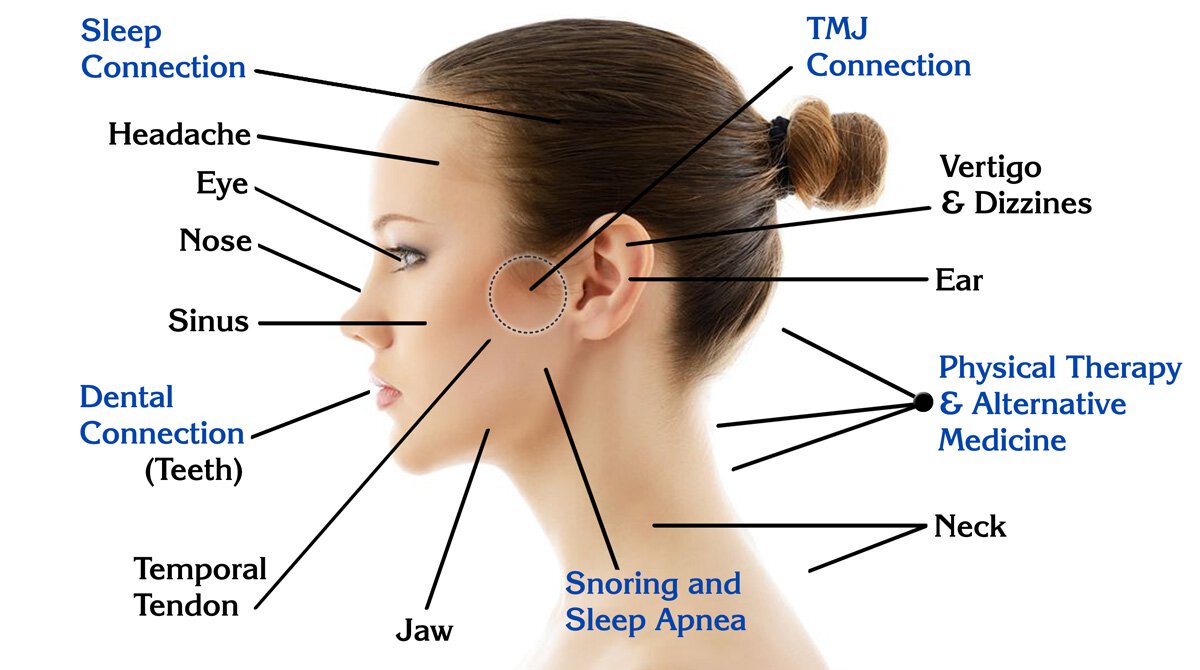

Because of the proximity the Temporomandibular joint has to the facial muscles, a TMJ patient can experience excruciating facial pain. If you have a "stabbing" pain behind your eyes that hinders your concentration and vision or pressure on your sinuses that has tricked you into thinking you have an infection or tenderness in the cheek and jaw areas where the slightest touch leaves you squirming in discomfort, then it's possible that you suffer from TMJ disorder.

Quit popping that 800mg of Ibuprofen, Imitrex, or Oxy like candy; it's time to seek a more permanent solution to your chronic migraine headaches once and for all. From his three decades of experience treating thousands of patients, neuromuscular TMJ specialist, Dr. Eddie Siman, has personally discovered that one of the most common symptoms expressed by TMJ disorder patients is chronic tension headaches and migraines with subsequent symptoms like visual disturbances and extreme sensitivity to light. Having diagnosed TMJ disorder as the source of countless headache patients, Dr. Siman has provided long-lasting relief to their headaches through natural and holistic processes, without any surgery or medication needed. In many severe cases, doctors misdiagnose the cause of headaches, and some patients are given no option other than to take pain pills that provide only temporary relief. But a simple understanding of the relationship between your headaches and jaw could go a long way toward finally and permanently eliminating your headaches.
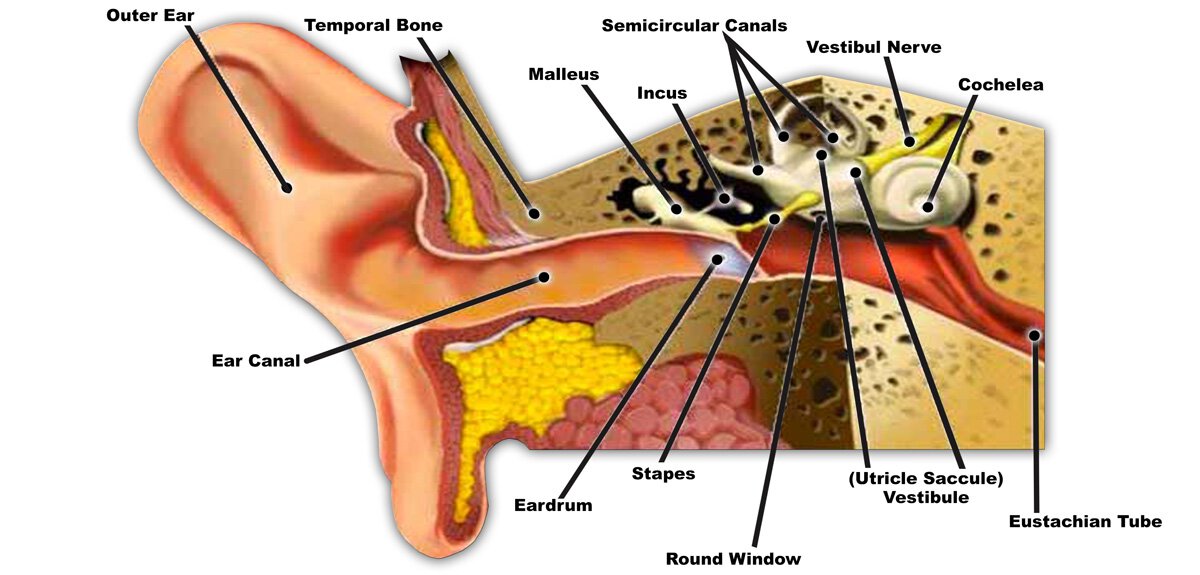
The Temporomandibular joint is located directly next to your ear. They even share the same muscles and nerves. If you experience a ringing, buzzing, or whooshing sound in one or both ears, it may be coming from your TMJ caused by a misaligned jaw. Ringing in the ears, or tinnitus, one of the most common ear-related symptoms, may be a result of TMJ disorder. This incessant ringing in the ears can occur when there is trauma inflicted upon the jaw and ear area, when the surrounding muscles of the TMJ are strained, or when the fibrous disc in the joint is dislocated from repetitive stress.
At Dr. Siman's Sherman Oaks private TMJ practice, we have had TMJ disorder patients report other ear-related symptoms like ear congestion, ear pain, infection, muffled hearing, and even head congestion. If you suffer from any of these and have been told by medical doctors such as ENT's and neurologists that there is no solution and you have to accept your condition, it is time to think outside the box. The problem may be coming from your jaw. Through his expertise in the field, Dr. Siman has provided relief to countless tinnitus patients by simply and holistically repositioning the jaw without a single injection or surgery.

Many are unaware of the root cause of their upper body aches and discomfort; an uneven bite may be the source of these TMJ symptoms. The bones, joints, muscles, and nerves of the face and upper body have a complex, intricate relationship. A single component within this group cannot operate without the proper functioning of the others. As the saying goes, "a chain is no stronger than its weakest link." This is most certainly true when it comes to the Temporomandibular joint in association with the neck, shoulders, and upper back. They all work together, relieving strain on the jaw and surrounding muscles, but when the TMJ is out of alignment — strained or damaged — the neck and other surrounding regions will suffer. When an individual has TMJ disorder, the sore, tight, and contracted muscles encompassing the joint will cause the head and shoulders to tilt in a forward position, resulting in the neck, shoulder, and back muscles compensating and ultimately straining in pain.
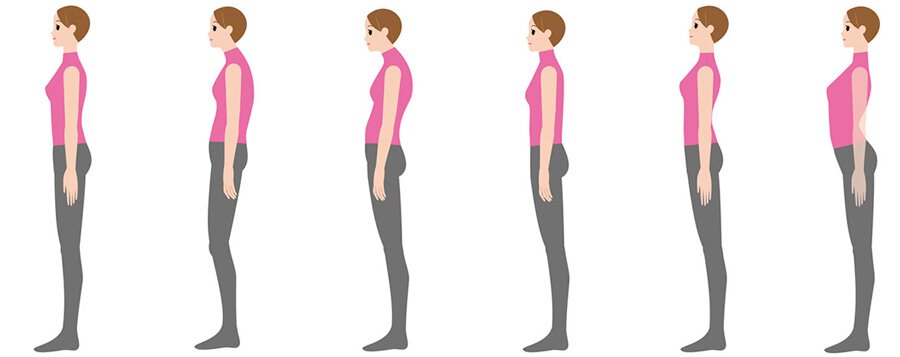
An unbalanced bite or TMJ may be a major contributor to bad posture. It may sound odd, but it may not be a coincidence if you have an uneven bite and also tend to slouch. When the muscles surrounding your dysfunctional TMJ become over-contracted, it pulls the muscles that hold up your head, creating a forward-leaning posture as though you are slouching. This slouching action creates a ripple effect down your body, pulling and stressing your face, neck, shoulder, and back muscles. Postural complications as a result of TMJ can even cause one shoulder or hip to dip lower than the other. When your entire body is not lined up properly, you may find yourself increasingly sluggish and tired throughout your day. You may feel out of balance, out of control, and without strength. If any of these describe you and your posture, it may be time to consider if TMJ disorder is the problem.

If your jaw is popping or locking, you may have a common case of TMJ disorder. With these TMJ symptoms, it's pretty straightforward; when your bite is uneven or any other of the common causes of TMJ are in play, the TMJ disc is displaced or damaged, which causes the joint spaces to become closed. As a result, you may experience clicking, grinding, or popping upon opening or closing your mouth or while doing common activities such as eating or yawning. In addition to your jaw becoming stuck or locked out of place, you're probably suffering through some pain or tenderness in your jaw joint and may even be struggling with self-consciousness due to a visual misalignment. Don't second guess these obvious TMJ symptoms; come to Dr. Eddie Siman and quiet the discomforting click of your jaw.

If you suffer from sleep apnea and snoring, most likely you are equipped with a face-smothering C-PAP machine, and there's a good possibility that you may also suffer from TMJ disorder but are unaware of it. If your Temporomandibular joint is out of alignment, the positioning of the tongue in your mouth is heavily impacted by the alignment of your upper and bottom teeth (vice versa during childhood development). So when there is a strain of the TMJ as a result of misalignment, the tongue is forced into an awkward position, blocking the airway. Additionally, the lower jaw may fall backward, further restricting breathing as you lie down. As an alternative to the C-PAP machine, you may qualify for a simple oral device that you can comfortably wear at night that will eliminate the noisy and uncomfortable C-PAP machine.
Read More

The temporomandibular joint (TMJ) is one of the most complex and frequently used joints in the body, enabling vital functions like chewing, speaking, and even smiling. Understanding the underlying causes of TMJ disorder is the first step in addressing the problem effectively. Let’s look into the most common causes and how they may affect your jaw health over time.
As a teenager or even a young adult, you may have received braces or Invisalign to straighten your teeth.
An unbalanced bite is one of the most significant TMJ causes and detrimental factors to one's TMJ-related suffering. But an unbalanced bite does not randomly occur. Respiratory issues at a young age can pose TMJ risks later in life, but other variables could be contributing to the uneven way your bottom and top jaw meet. Aside from the natural erupting pain that wisdom teeth can have on the gums and cheeks, failing to remove them may impact your teeth and further contort your jaw into a disproportionate V-shape. Another significant cause of TMJ problems in teenagers and adults is poor orthodontics, where the teeth are straightened with no attention paid to the position of the jaw and the comfort of the facial muscles.
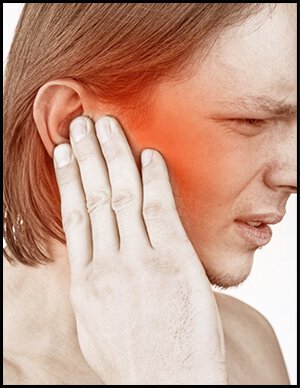
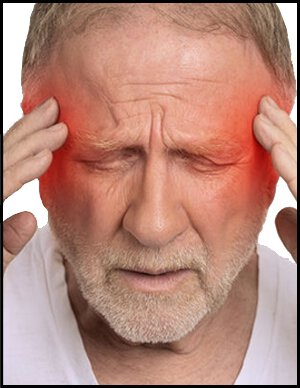
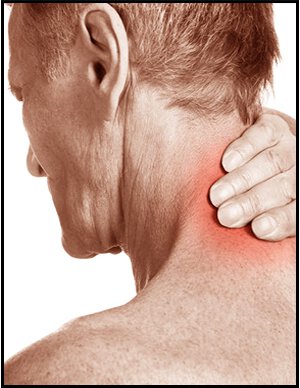
As a teenager or even a young adult, you may have received braces or Invisalign to straighten your teeth.
Time has passed, and your teeth are still straight, but recently you've been dealing with jaw pain, headaches, ear problems, and clicking. There has been much research conducted showing that braces and post-orthodontic treatment can contribute to individuals developing TMJ-related problems. While the purpose of braces is to straighten teeth, little-to-no thought is given to the fact that orthodontic treatment can disturb the proper position of the jaw by compressing and then stressing the TMJ and surrounding muscles.


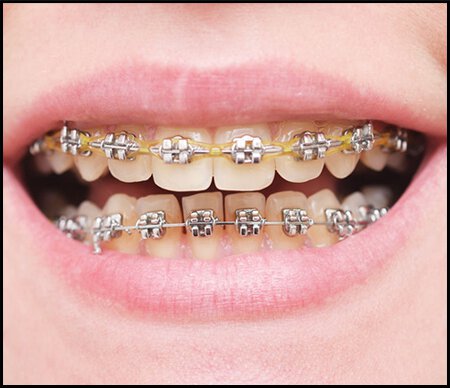
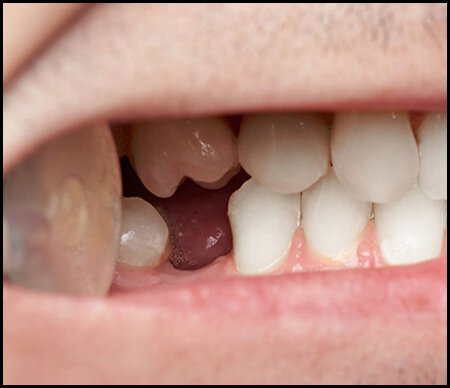
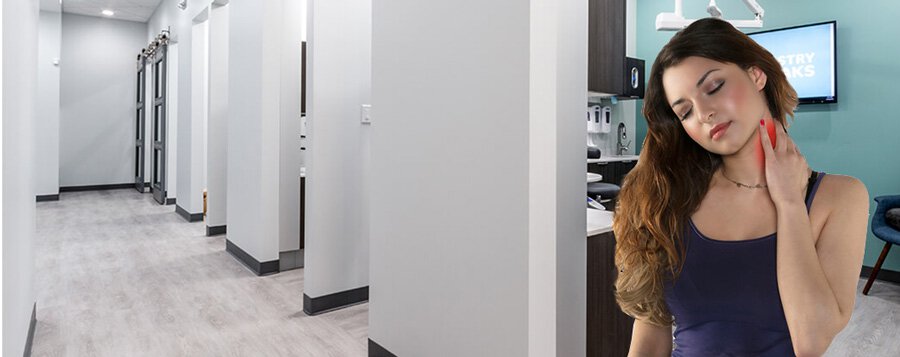
We've all been there: roughhousing with a sibling or friend, then and all of sudden — boom! You get hit in the jaw. That sudden blunt force may or may not have resulted in a dislocated jaw, but if it did, there is a strong possibility that it is the main reason behind your tinnitus, headaches, and neck and shoulder pain. Yes, you heard (or didn't) right: Jaw dislocation or trauma to the mandibular area is yet another leading TMJ cause. Whether it's from a car accident, severe fall, or a punch to the face, any intense physical impact to this area can damage your TMJ. But believe it or not, trauma to more indirect areas like the back or neck can also lead to TMJ disorder. It's no secret that if your back goes out, it affects the neck. When the neck muscles are affected or traumatized, that can disturb the jaw muscles through the nerve signals that go to the brain. The nerves in the jaw and neck muscles influence and alter the function of the other, so any kind of trauma or stress to these areas may eventually result in TMJ-related tension and symptoms.
For our patients in Sherman Oaks & Beverly Hills TMJ causes may be physical, but there are mental and neurological factors to take into account as well.
Learning to control your stress and anxiety may help relieve your TMJ symptoms. When you are under psychological distress (however that may manifest itself) the muscles in your face stress and tighten as you unknowingly grimace. Among these tightened muscles are those surrounding the TMJ. Anxiety and stress may also cause one to grind or clench their teeth (bruxism), both while wide awake and during sleep. Grinding not only damages the teeth, but also induces improper dental occlusion, which causes the jaw to misalign from its natural position, and thus the TMJ is disrupted and strained.


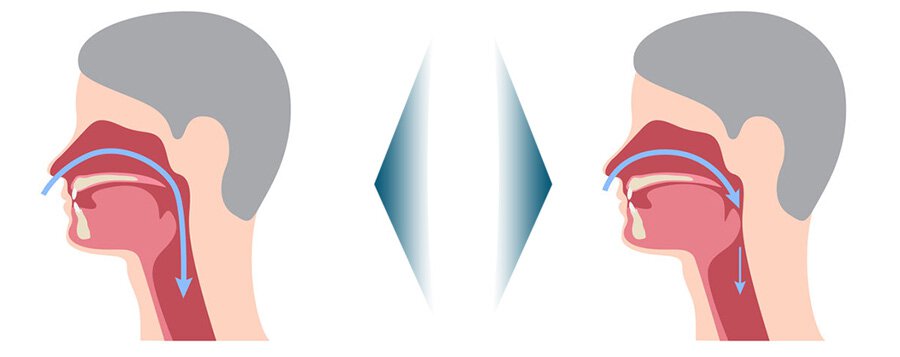
You may be wondering how does having asthma as a child give you lockjaw 20 years down the line? The tongue, which is naturally pushed outward to balance the inward force created by the lips and cheeks, acts as a cushion between the top and bottom teeth. If a child can breathe normally through the nose, the tongue will sit comfortably behind the upper teeth. On the other hand, when a child cannot breathe properly through the nose, the tongue drops down behind the bottom teeth to allow easier airflow, which results in mouth breathing. In this case, the tongue can no longer counterbalance the inward force of the lips and cheeks, which over time, changes the upper jaw's shape from a "U" to a disproportionate "V." Just like how the triangular-shaped peg wouldn't fit into the circular hole, a V-shaped jaw won't properly rest on the U-shaped bottom jaw, causing the biggest determinant of TMJ: an uneven bite.

Rheumatoid arthritis (RA) is a systemic inflammatory and slowly progressive auto-immune disease that can result in cartilage and bone destruction of joints, including the Temporomandibular joint. Yes, the RA affecting the joints in your hands may be the same culprit behind the inability to open your mouth wide. Though the damaging disease rarely attacks the TMJ region in its initial stages, RA eventually creeps in over time and affects the TMJ in just over 50% of patients. Unfortunately, because the TMJ is one of the last joints RA will affect, dentists and oral surgeons alike have a difficult time diagnosing this exact TMJ cause.
Dr. Siman is the most trusted Beverly Hills & Sherman Oaks TMJ specialist because he helps patients find permanent relief through holistic care and expert treatment. Over three decades ago, Dr. Siman noticed his cosmetic dentistry patients were returning with damage to their cosmetic dental work and dental implants because of teeth grinding and improper care because of the pain they were experiencing.
Patients complained of ringing in their ears, neck and shoulder pain. Dr. Siman understood there is a jaw-body connection, and the issue is not the cosmetic work itself but because of an unbalanced bite. However, the TMJ solutions that were available decades ago were not adequate. So Dr. Siman dedicated his career and educated himself in the most advanced and up-to-date treatments available in the world.
He incorporated various high-tech and computerized equipment in his armanitarium and modified and designed custom oral devices based on current FDA-approved biocompatible materials. Since that date, Dr. Siman has successfully treated and changed the lives of thousands of patients from the United States and around the world. Today, numerous testimonials commend Dr. Siman's out-of-the-box approach to TMJ diagnosis and non-surgical treatment.
Stop living in pain; it is time to be pain-free.
If you'd like to learn more about our holistic, non-invasive, and non-surgical TMJ treatments Sherman Oaks & Beverly Hills TMJ specialist, Dr. Eddie Siman, can answer any questions you have during your initial consultation. Dr. Siman has helped thousands of patients transform their lives and their smiles. Learn how he can help you at the TMJ Expert. Call us today!


Dr. Eddie Siman has over 35 years of experience and is a premier TMJ and Sleep Apnea expert in Los Angeles and Orange County. Many come to Dr. Eddie Siman with severe tinnitus, migraine problems, and sleep apnea with no relief in sight. Little do these patients know that their painful symptoms are tied to the Temporomandibular joint (TMJ). Think outside the box and pay a simple visit to Dr. Siman today so you can finally find the source of all your pain and get rid of it once and for all.
Schedule your Private Consultation and Diagnosis Appointment with Dr. Siman Expert TMJ, Cosmetic Dental, and Sleep Apnea Treatments.
Call today (818) 574-5009
14629 Ventura Blvd, Sherman Oaks, CA 91423
414 N. Camden Drive Suite #1240, Beverly Hills, CA 90403